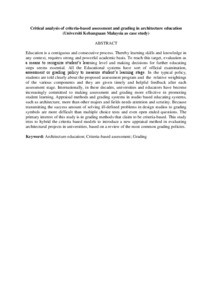Citation
Hassanpour, Badiossadat and Utaberta, Nangkula and Zaharim, Azami
(2012)
Critical analysis of criteria-based assessment and grading in architecture education (Universiti Kebangsaan Malaysia as case study).
Research Journal of Applied Sciences, Engineering and Technology, 4 (14).
pp. 2046-2054.
ISSN 2040-7467
Abstract
Education is a contiguous and consecutive process. Thereby learning skills and knowledge in any context, requires strong and powerful academic basis. To reach this target, evaluation as a means to recognize student’s learning level and making decisions for further educating steps seems essential. All the Educational systems have sort of official examination, assessment or grading policy to measure student’s learning stage.In the typical policy, students are told clearly about the proposed assessment program and the relative weightings of the various components and they are given timely and helpful feedback after each assessment stage. Internationally, in these decades, universities and educators have become increasingly committed to making assessment and grading more effective in promoting student learning. Appraisal methods and grading
systems in studio based educating systems, such as architecture, more than other majors and fields needs
attention and scrutiny. Because transmitting the success amount of solving ill-defined problems in design
studios to grading symbols are more difficult than multiple choice tests and even open ended questions. The primary interest of this study is in grading methods that claim to be criteria-based. This study tries to hybrid the criteria based models to introduce a new appraisal method in evaluating architectural projects in universities,
based on a review of the most common grading policies.
Download File
![[img]](http://psasir.upm.edu.my/61248/1.hassmallThumbnailVersion/Critical%20analysis%20of%20criteria-based%20assessment%20and%20grading%20in%20architecture%20education%20%28Universiti%20Kebangsaan%20Malaysia%20as%20case%20study%29.pdf)  Preview |
|
Text (Abstract)
Critical analysis of criteria-based assessment and grading in architecture education (Universiti Kebangsaan Malaysia as case study).pdf
Download (100kB)
| Preview
|
|
Additional Metadata
Actions (login required)
 |
View Item |

